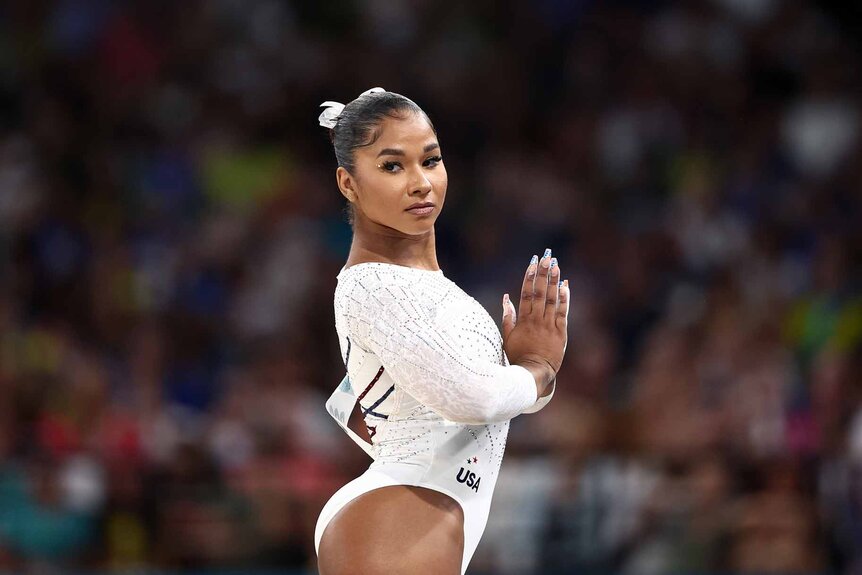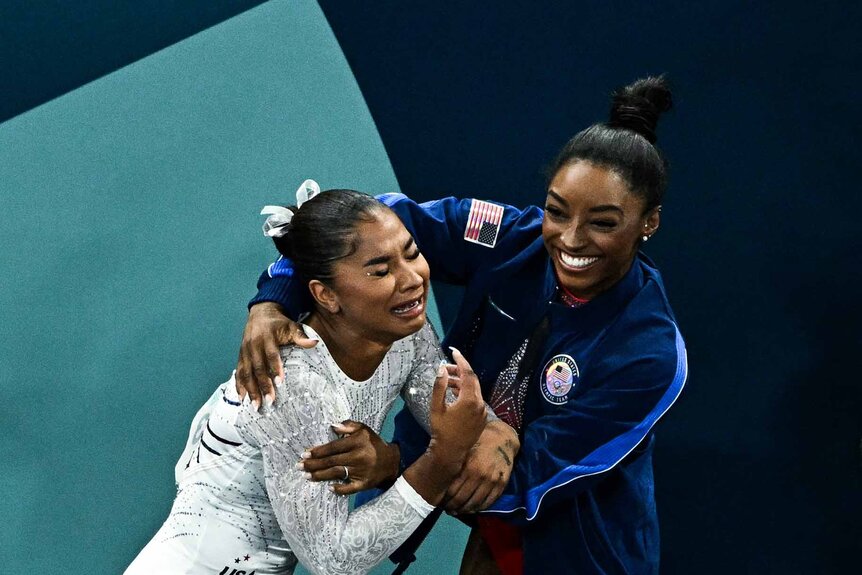What Happened to Jordan Chiles’ Olympic Bronze Medal in Floor Exercise?
Jordan Chiles was stripped of her bronze medal in women's individual floor exercise after a dramatic series of appeals.

U.S. gymnast Jordan Chiles' controversial bronze medal in the women’s individual floor exercise at the Paris Olympics has only gotten moreso.
The International Olympic Committee has ordered the 23-year-old to return her medal after a court ruled it had been awarded to her after an improper coach’s appeal. The medal has instead been given to Romania’s Ana Bǎrbosu.
The United States Olympic & Paralympic Committee signaled its intent to file an appeal, according to NBC News.
“We firmly believe that Jordan rightfully earned the bronze medal, and there were critical errors in both the initial scoring by the International Gymnastics Federation (FIG) and the subsequent CAS appeal process that need to be addressed,” it said in a statement.
RELATED: Here Are All the U.S. Medal Winners at the 2024 Paris Olympics
“Given these circumstances, we are committed to pursuing an appeal to help Jordan Chiles receive the recognition she deserves,” the committee said. “We remain dedicated to supporting her as an Olympic champion and will continue to work diligently to resolve this matter swiftly and fairly.”
Why Was Jordan Chiles Initially Given the Bronze?
On Monday, August 5, Chiles competed in the women’s individual floor exercise, days after she and her teammates won the team gold in dominant fashion. Chiles was the final competitor, and received an initial score of 13.666, which put her in fifth place behind two Romanian gymnasts, Bǎrbosu and Sabrina Maneca-Voinea, both with scores of 13.700. However, Chiles’ coach Cecile Landi thought that the judges may have missed a component of her routine – a split leap – that would have raised the degree of difficulty for the routine and, thus, her final score.
Two factors go into a gymnastics judge’s score: execution and difficulty. Execution scores are subjective and thus aren’t appealable. Difficulty is supposed to be objective, and are open to appeals, though there is a strict frameworks under which an appeal can be filed. First, a verbal inquiry must be communicated to the judge within a minute of the score being posted, then the appeal must be confirmed in writing within an additional four minutes. Coaches filing an appeal just also be willing to pay a fee if the judges’ initial decision is upheld – in this case 300 Swiss francs (or about $351 USD), with the amounts escalating for additional appeals so coaches don’t abuse the system.
Landi filed such an appeal and the judges agreed they had not, in fact, credited Chiles for the split leap in her routine, thus raising her score a full tenth of a point, to 13.766, which leapfrogged her over Bǎrbosu and Maneca-Voinea. Because Chiles was the last performer, the timing was incredibly awkward, as Bǎrbosu was on the floor celebrating with a Romanian flag (though there scores were tied, Bǎrbosu had a higher execution score than her compatriot, giving her third place) thinking she had won bronze when Chiles’ new score flashed. As everything sunk in, she lowered her flag and burst into tears.
RELATED: What's in the Box that Olympic Winners Get along with their Medals?
Romanian officials were outraged over the affair and immediately pledged to appeal. The country’s prime minister, Marcel Ciolacu said he’d be boycotting the Olympic Closing Ceremony in protest, and Romanian gymnastics legend Nadia Comǎneci weighed in on X about Bǎrbosu’s treatment.
"I can’t believe we play with athletes mental health and emotions like this… let’s protect them," she wrote.
Why Was Chiles Stripped of Her Bronze Medal?
Romanian officials followed through with their appeal, which they filed with the Court of Arbitration for Sport (CAS), an independent ruling body based in Lausanne, Switzerland. The court determined on Saturday, August 10 that Chiles’ coach had made the initial verbal appeal four seconds too late, thus invalidating it. On Sunday, August 11, the IOC stated it would abide by the court’s decision, awarding the medal to Bǎrbosu and seeking to reclaim the prize already given to Chiles, who by that point had returned to the U.S.
“Following the CAS decision with regard to the Women’s Artistic Gymnastics Floor Exercise Final and the amendment of the ranking by the International Gymnastics Federation, the IOC will reallocate the bronze medal to Ana Bărbosu (Romania),” the IOC said in its statement. “We are in touch with the NOC of Romania to discuss the reallocation ceremony and with USOPC regarding the return of the bronze medal.”
USA Gymnastics Say They Have Proof Appeal Was Filed Within Time Limit
Following the IOC ruling on Chiles' medal, USA Gymnastics released a statement saying they have video proof that Chiles' coach lodged her verbal appeal within the required 60 seconds and have submitted it to the CAS.
According to the statement, the gymnastics body says "time-stamped video evidence" shows Cecil Landi submitted the verbal inquiry 47 seconds after Chiles' score was posted. They've asked the CAS to revise its ruling against Chiles.
CAS Rejects USA Gymnastics' Appeal
Later on Monday, August12, following USA Gymnastics' submission of the video evidence, the organization said that the Court of Arbitration for Sport had rejected their request to reevaluate its decision.
"USA Gymnastics was notified by the Court of Arbitration for Sport (CAS) on Monday that their rules do not allow for an arbitral award to be reconsidered even when conclusive new evidence is presented," the organization said in a statement. "We are deeply disappointed by the notification and will continue to pursue every possible avenue and appeal process, including to the Swiss Federal Tribunal, to ensure the just scoring, placement, and medal award for Jordan."
How has Jordan Chiles responded?
In an August 15 message posted to Instagram, Chiles said she was "overwhelmed by the love I have received over the past few days," noting she "had confidence in the appeal brought by the USAG, who gave conclusive evidence that my score followed all the rules. This appeal was unsuccessful."
"I have no words. This decision feels unjust and comes as a significant blow, not just to me, but to everyone who has championed my journey. To add to the heartbreak, the unprompted racially driven attacks on social media are wrong and extremely hurtful. I've poured my heart and soul into this sport and I am so proud to represent my culture and my country.
"I will never waver from my values of competing with integrity, striving for excellence, upholding the values of sportsmanship and the rules that dictate fairness. I have taken pride in cheering on everyone regardless of team or country. Finding joy again has been a culture shift and I love seeing others embrace it. I feel like I have given everyone permission to be authentic to who they are.
I am now confronted with one of the most challenging moments of my career. Believe me when I say I have had many. I will approach this challenge as I have the others - and will make every effort to ensure that justice is done. I believe that at the end of this journey, the people in control will do the right thing."
Questions about the CAS Panel Emerge
On Tuesday, August 13, the New York Times reported that the head of the panel that ruled against Chiles has a lengthy history of representing Romania in other arbitration cases.
Hamid G. Gharavi, a France-based attorney, presided over the panel hearing Romania's appeal of Chiles' bronze. Documents cited by the Times show he is currently serving as Romania's representative at the World Bank’s International Centre for the Settlement of Investment Disputes. Members of the court are required to disclose potential conflicts of interest and the CAS said that Gharavi had done so in writing before hearing the gymnastics dispute, and that no parties involved objected to his participation.
“In accordance with the guidelines on conflicts of interest issued by the International Bar Association (IBA), CAS has no reason to remove an arbitrator making such disclosure if the parties do not object to his/her appointment,” the court said.
Romania Proposes Three Bronze Medals
While USA Gymnastics considers its next move after the CAS declined to revisit its ruling, the Romanian Gymnastics Federation said in a statement that it had proposed awarding bronze medals to all the gymnasts involved: Chiles, Bǎrbosu and Maneca-Voinea.
“The initiative to award bronze medals to all three athletes, Jordan Chiles, Ana-Maria Bărbosu, and Sabrina Maneca-Voinea, was proposed by the lawyers of the Romanian Gymnastics Federation, with the prior approval of the Federation,” the organization said in a statement.
“The leadership of the Romanian Gymnastics Federation (FRG), through its representatives, took all necessary steps to reach this consensus. We emphasize that certain requests were made by the American side to achieve this goal, and our side consistently complied with these requests, a fact that was appreciated by the American representative.”
Originally published Aug 21, 2024.

















